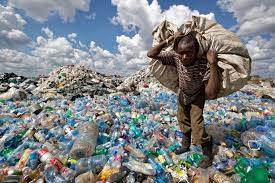Plastic pollution is increasingly jeopardizing Nigeria’s tourism industry, public health, and marine ecosystems, according to experts from the Association of Professional Women Engineers of Nigeria (APWEN). Speaking at a public lecture in Lagos to commemorate World Environment Day, the association highlighted the urgent need for sustainable solutions to address the growing environmental crisis.
Keynote speaker Agharese Onaghise, Executive Director of the Food and Beverage Recycling Alliance, emphasized that plastic waste not only damages natural attractions but also deters tourists, a significant contributor to Nigeria’s economy. She noted that plastic pollution harms the fishing industry by damaging gear and contaminating catches, negatively impacting livelihoods. Additionally, the collection, transportation, and disposal of plastic waste are costly, burdening taxpayers and straining local budgets.
Onaghise called on the government to play a pivotal role in ending plastic pollution by establishing robust policies and regulatory frameworks that promote sustainable practices and circularity. She advocated for creating an enabling environment where industries and individuals are encouraged and incentivized to adopt eco-friendly alternatives. Through the development of national sustainability initiatives, the government can provide a clear roadmap for plastic reduction while attracting investment to support innovation and infrastructure that facilitate sustainable production, consumption, and waste management.
Beyond policy formulation, Onaghise stressed the importance of effective implementation by enforcing regulations, monitoring compliance, and evaluating progress consistently. Public engagement is equally essential; raising awareness through campaigns and education helps build a culture of environmental responsibility. By driving socially meaningful interventions and fostering partnerships across the public and private sectors, the government can lead a coordinated, long-term response to plastic pollution that safeguards both public health and the environment.
thenationonlineng.net
Atinuke Owolabi, Chairman of the APWEN Lagos Chapter, described plastic pollution as an alarming environmental challenge, threatening ecosystems, marine life, food security, and public health. She emphasized that as engineers and change agents, technical expertise must be matched with advocacy, innovation, and public engagement. Owolabi introduced the Waste Museum Model, developed through grassroots innovation, as a unique blueprint for transforming plastic waste into powerful educational and community tools. The model emphasizes sustainability, creativity, and the circular economy, principles that every community can adopt to tackle the plastic crisis from the ground up.
Through this initiative, APWEN aims to empower citizens, especially young women and girls, with the knowledge and responsibility to drive environmental change. Owolabi called for a shift from a disposable culture to sustainable practices and assured all stakeholders—government, industry, academia, and the public—of APWEN’s readiness for collaboration in advancing innovative, practical, and inclusive solutions to end plastic pollution. The association remains committed to driving impactful conversations and engineering leadership that supports a greener, cleaner Lagos and Nigeria.
The call to action from APWEN underscores the urgent need for comprehensive strategies to combat plastic pollution in Nigeria. By integrating sustainable practices into various sectors and fostering a culture of environmental responsibility, the country can mitigate the adverse effects of plastic waste and promote a healthier, more sustainable future for all.
